For over two decades, Google has been the search engine that most people use for everyday searches, product research, and staying up to date on the latest news.
Because of this market dominance, Google has also been the main search engine of focus for SEO and marketing professionals.
However, following the introduction of ChatGPT and Bing Chat, Google founders Larry Page and Sergey Brin reportedly returned to take an active role in Google’s plans to add chatbot features to Google Search.
Shortly after that, around May 2023, Google introduced the chatbot Bard, and after a year, rolled out “AI Overviews” on May 14, 2024 to USA-based searchers. OpenAI followed suit with ChatGPT search in late 2024, transforming the former SearchGPT prototype into a fully integrated search feature within ChatGPT.
However, no matter what happens, there are still several alternative search engines that offer distinct advantages over Google, such as enhanced privacy, specialized content, unique algorithms, and tailored user experiences.
Here are 24 of the best alternative search engines you can try.
List of Alternative Search Engines
- 1. Bing.com
- 2. Perplexity.ai
- 3. You.com
- 4. ChatGPT Search
- 5. Yep.com
- 6. Openverse
- 7. Yahoo.com
- 8. Ecosia
- 9. Aol
- 10. DuckDuckGo
- 11. Startpage
- 12. Swisscows
- 13. Gibiru
- 14. Brave
- 15. Wiki.com
- 16. X (Formerly Twitter)
- 17. SlideShare
- 18. Wayback Machine
- 19. WolframAlpha
- 20. LinkedIn
- 21. Baidu
- 22. Yandex
- 23. Sogou
- 24. Naver
AI-Powered Search Engines
Where search engines include AI chatbots based on large language models, they become prone to errors and hallucinations.
Always verify critical information you get from AI-based search engines, such as medical, financial, legal, safety, etc., using authoritative sources.
(Editor’s note: Creating content using generative AI is subject to the implications of a number of unresolved legal proceedings, and you should avoid publishing generative AI outputs as your own content.)
1. Bing.com
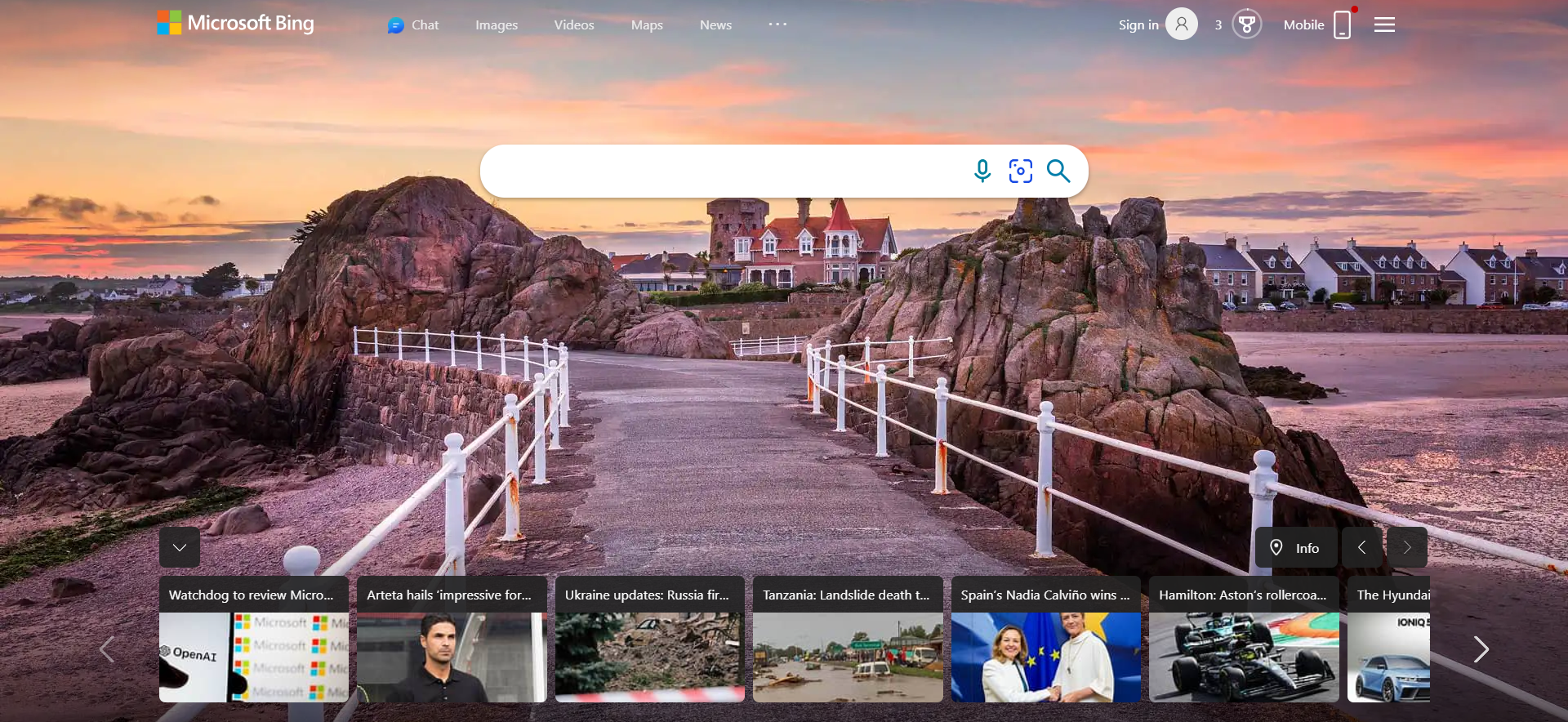 Screenshot from Bing.com
Screenshot from Bing.comAs of December 2023, Microsoft Bing sites handled 7.45% of all search queries in the United States.
One could argue that Bing outperforms Google in certain respects.
For starters, Bing has a rewards program that allows one to accumulate points while searching. These points are redeemable at the Microsoft and Windows stores, which is a nice perk.
In my view, the Bing visual search API is superior to its rivals and much more intuitive.
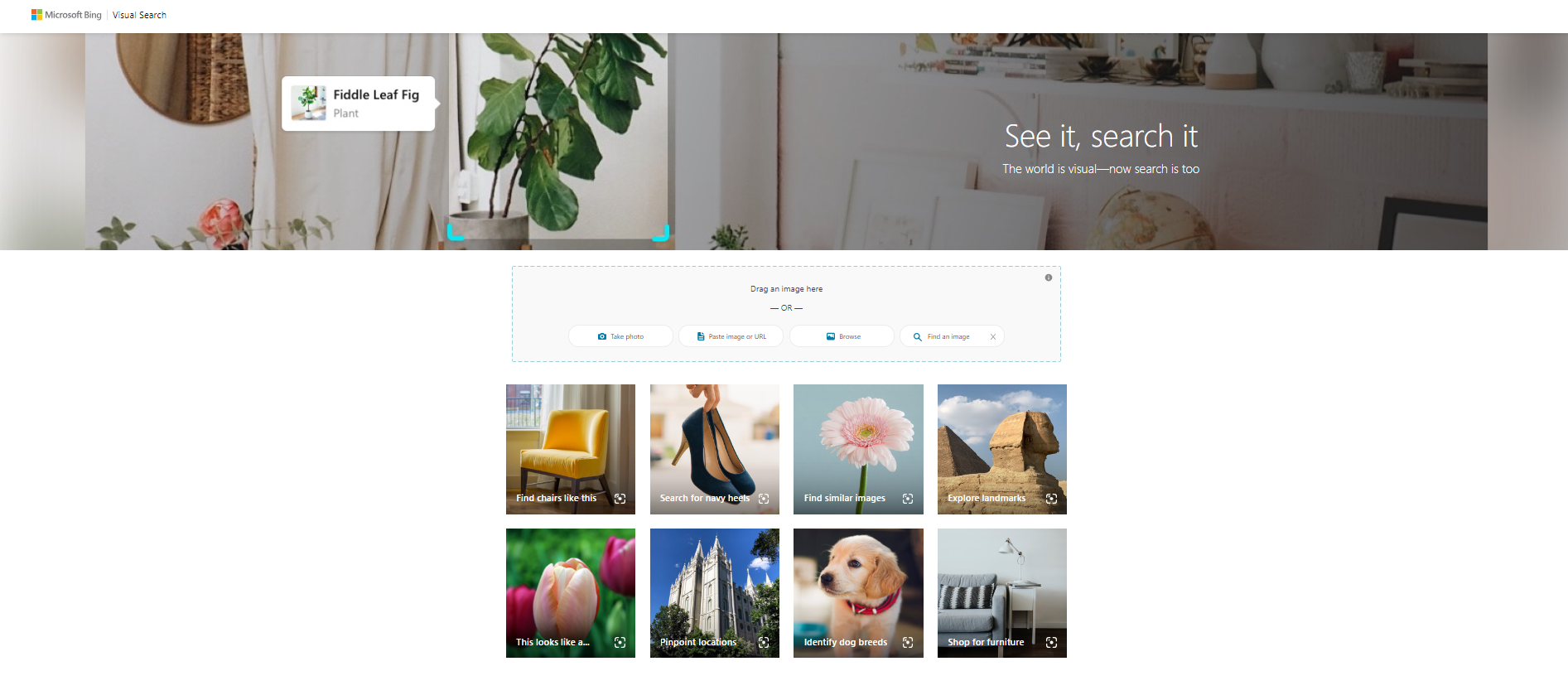 Screenshot from Bing Visual Search, December 2023
Screenshot from Bing Visual Search, December 2023Bing carries that same clean user experience to video, making it the go-to source for video searches without a YouTube bias.
On February 7, 2023, Bing announced an all-new, AI-powered version of its search engine called “Bing Chat,” which is now called Copilot. The stated goal is to “deliver better search, more complete answers, a new chat experience, and the ability to generate content.”
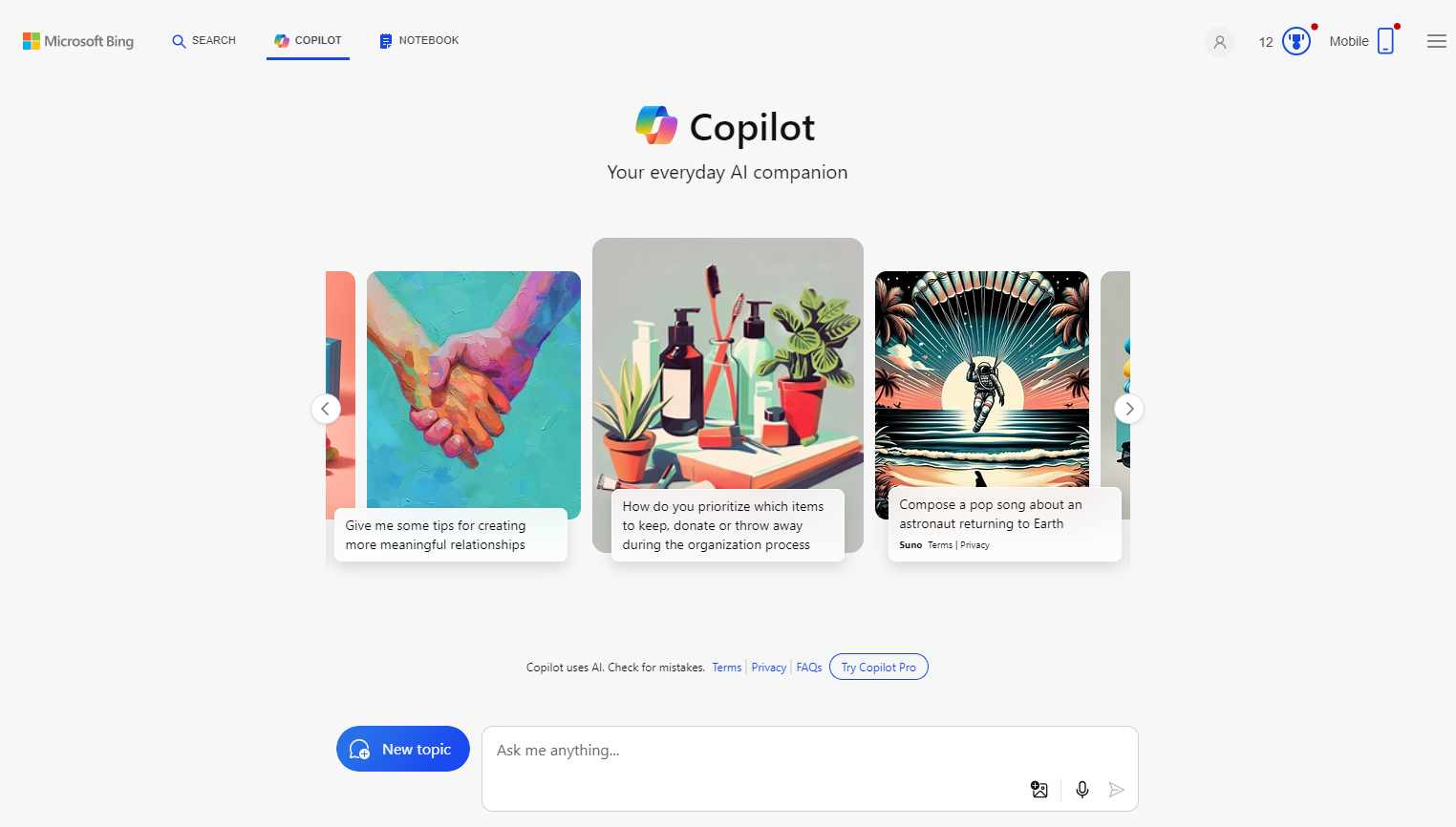 Screenshot from Copilot (formerly Bing Chat)
Screenshot from Copilot (formerly Bing Chat)According to Satya Nadella, chairman and CEO of Microsoft, there are 10 billion search queries a day, but approximately half of those go unanswered. Bing is looking to fill that void.
2. Perplexity.ai
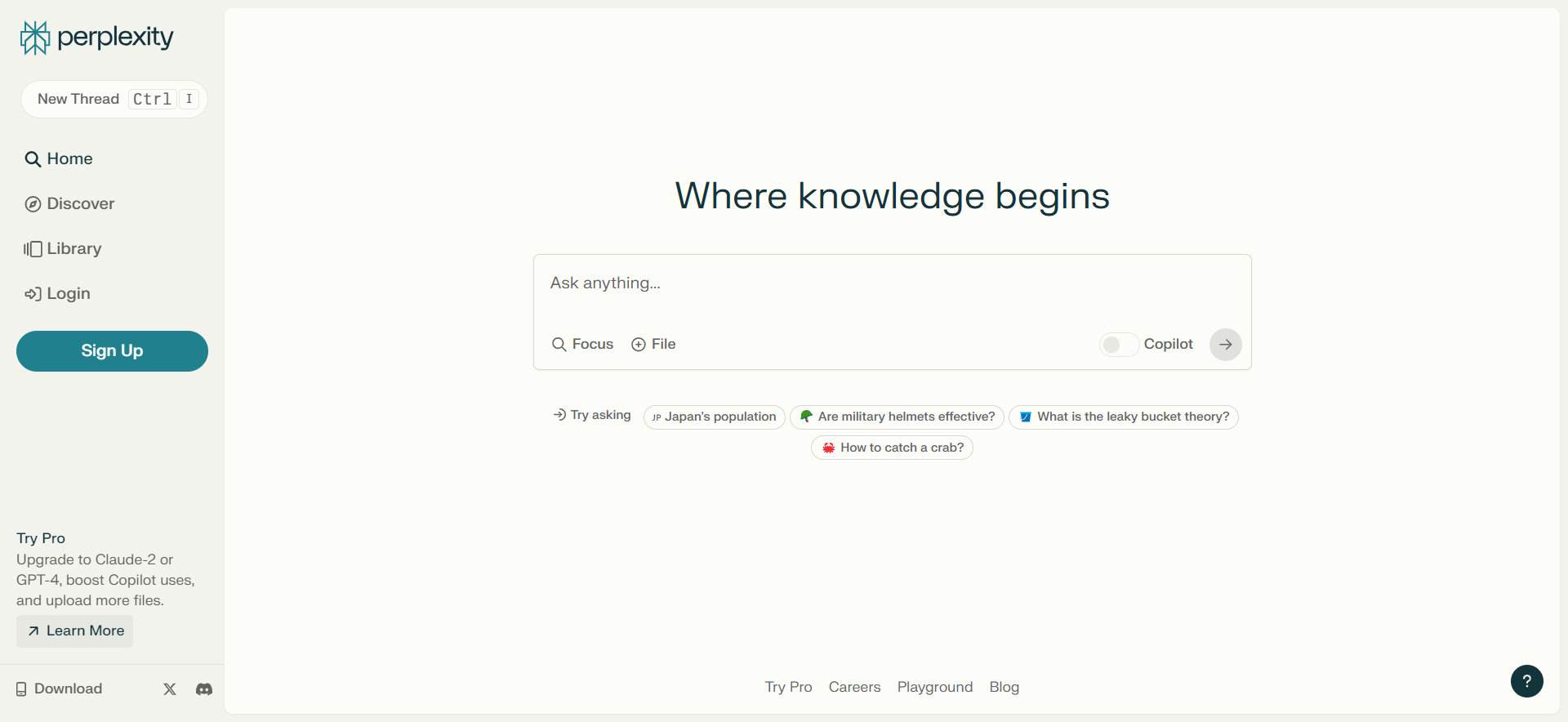 Screenshot from Perplexity.ai, December 2023
Screenshot from Perplexity.ai, December 2023Perplexity.ai, founded in 2022, is an innovative alternative to Google that provides contextually rich answers. It has 15 million users and answered 250 million queries as of July 2024.
Unlike traditional search engines that primarily link to webpages, Perplexity.ai is a chatbot that directly answers questions by citing sources from which it fetches information, with an option to ask follow-up questions.
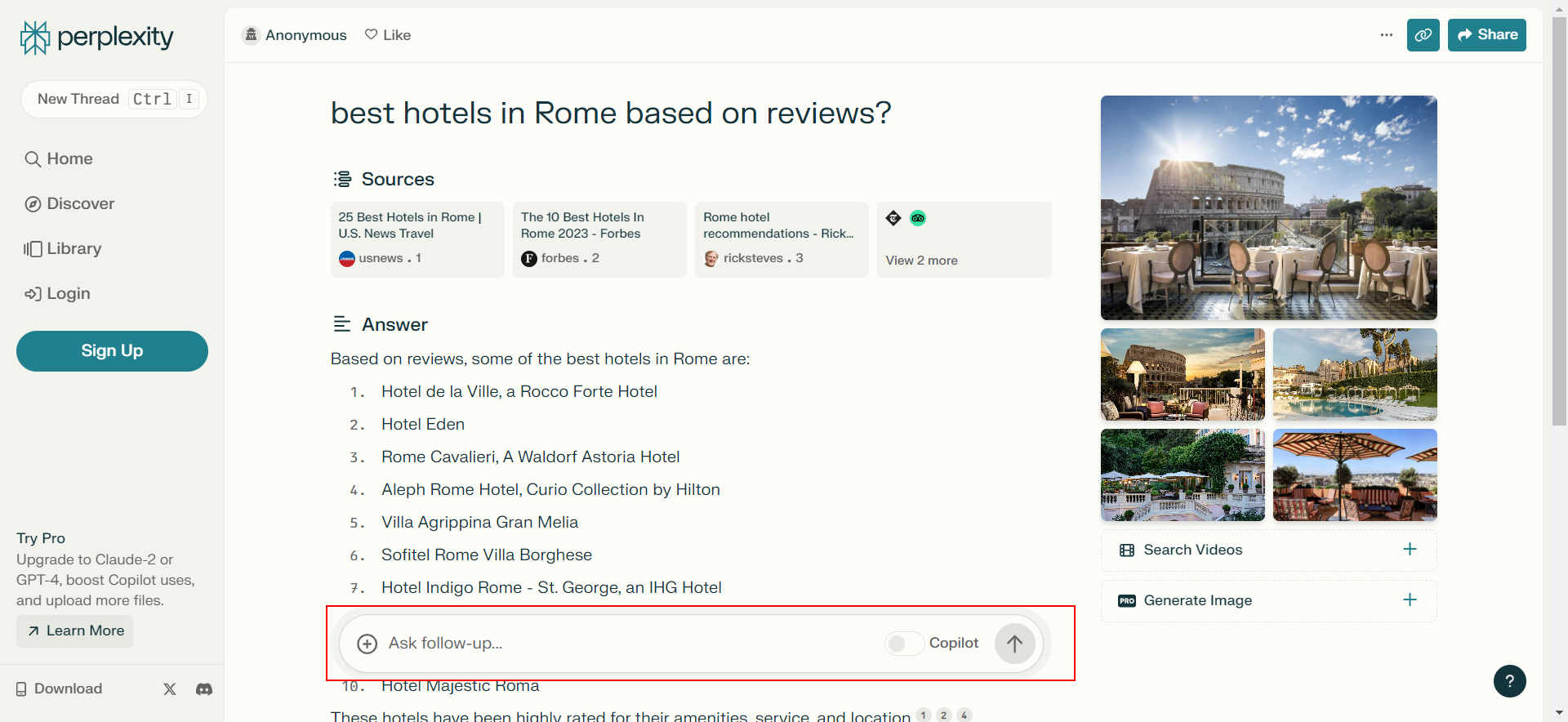 Screenshot from Perplexity.ai, December 2023
Screenshot from Perplexity.ai, December 2023This feature allows users to delve deeper into their initial queries by asking subsequent, related questions. This interactive approach mimics a conversational style, making it easier for users to refine their search and get more precise answers.
This evolving, dialog-based search experience positions Perplexity.ai as a compelling choice for users seeking a more intuitive and responsive search tool. Below is the feedback from Tobi Lütke, the CEO of Shopify, on Perplexity.ai.
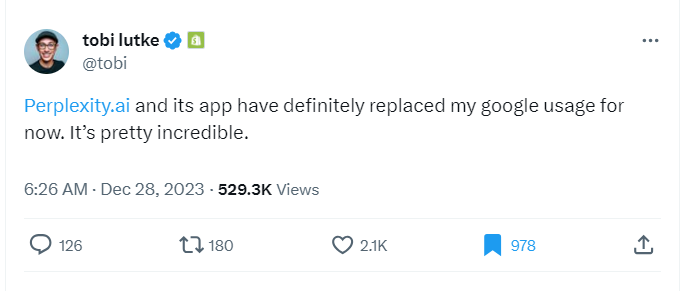 Screenshot from x.com
Screenshot from x.comHowever, since it uses LLMs for answer extraction, it can hallucinate, leading to incorrect or misleading answers.
3. You.com
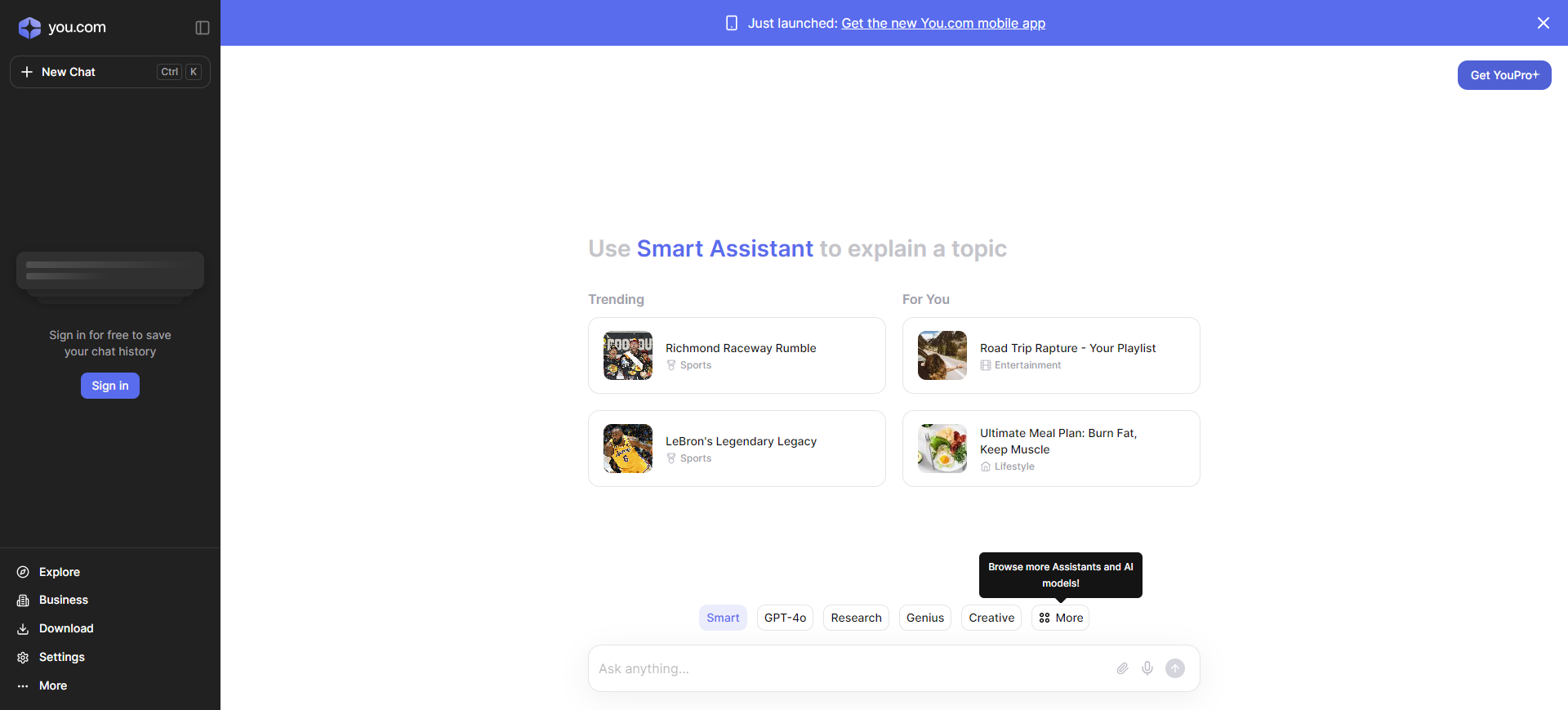 Screenshot from You.com
Screenshot from You.comYou.com is an AI-powered search engine founded by Richard Socher, a prominent natural language processing (NLP) researcher and former chief scientist of Salesforce. It reportedly has 11 million users as of May 2024.
The site operates in two modes: a personal mode and a private mode.
In personal mode, users can configure their source preferences. While in private mode, they enjoy a completely untraceable experience; no telemetry data is recorded.
The company also offers a Chrome extension, AI-powered image generation, and YouWrite, an AI writing assistant.
The open search platform encourages developers to build apps and contribute to a more open and collaborative internet.
4. ChatGPT Search
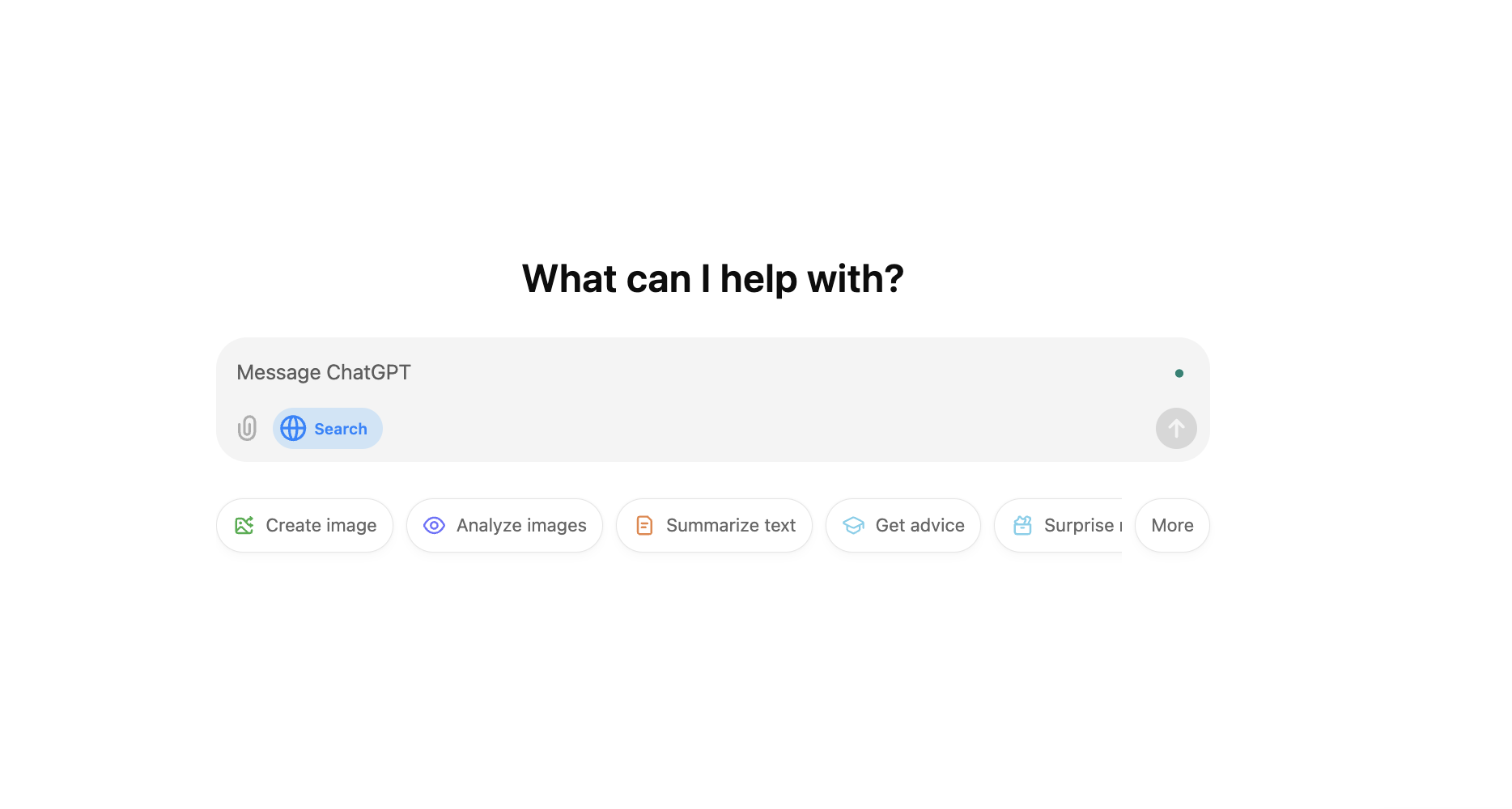 Screenshot from chatgpt.com, November 2024
Screenshot from chatgpt.com, November 2024Recently, OpenAI has introduced ChatGPT search, a new search feature that leverages live web data and AI to deliver relevant answers to users, including clear citations.
Previously released as a prototype called SearchGPT, it can now be used by anyone with a Plus or Team account, as well as those who signed up for the SearchGPT waitlist.
Key features:
- Ability to ask follow-up questions.
- It provides real-time information by pulling the latest data from the web.
- Content attributions and links back to the original content sources.
- Provides publishers with tools to manage how their content appears in ChatGPT Search.
While ChatGPT search is currently available only to a limited group, it will be rolled out to all Free users in the future. It has the potential to shake up the search engine market.
We’ll continue to update this article as more details emerge.
A Revenue-Sharing Search Engine
5. Yep.com
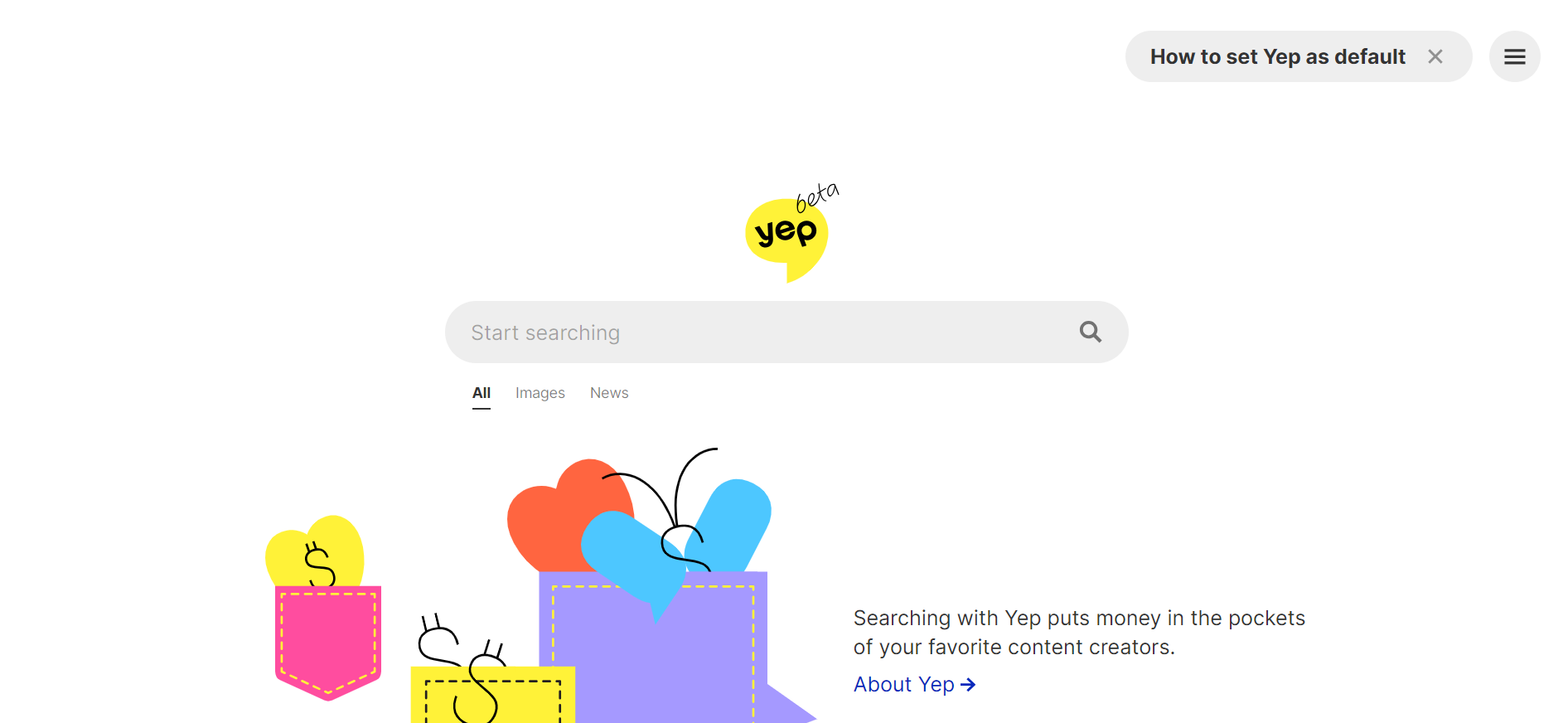 Screenshot from Yep.com
Screenshot from Yep.comYep.com (by Ahrefs) promotes itself as being a search engine with a difference that emphasizes user privacy by not tracking users or selling their data.
It monitors the frequency of specific word searches and the popularity of certain links in terms of clicks. However, it doesn’t compile a personal profile for the purpose of targeted advertising.
It is designed to directly reward and compensate content creators by using a 90/10 revenue share business model.
This means that 90% of all advertising revenue goes directly to the creators of content, allowing them to earn money for their work.
In addition, this business model allows users to directly support their favorite content creators and ensures that content creators are fairly compensated.
A Copyright-Free Search Engine
6. Openverse
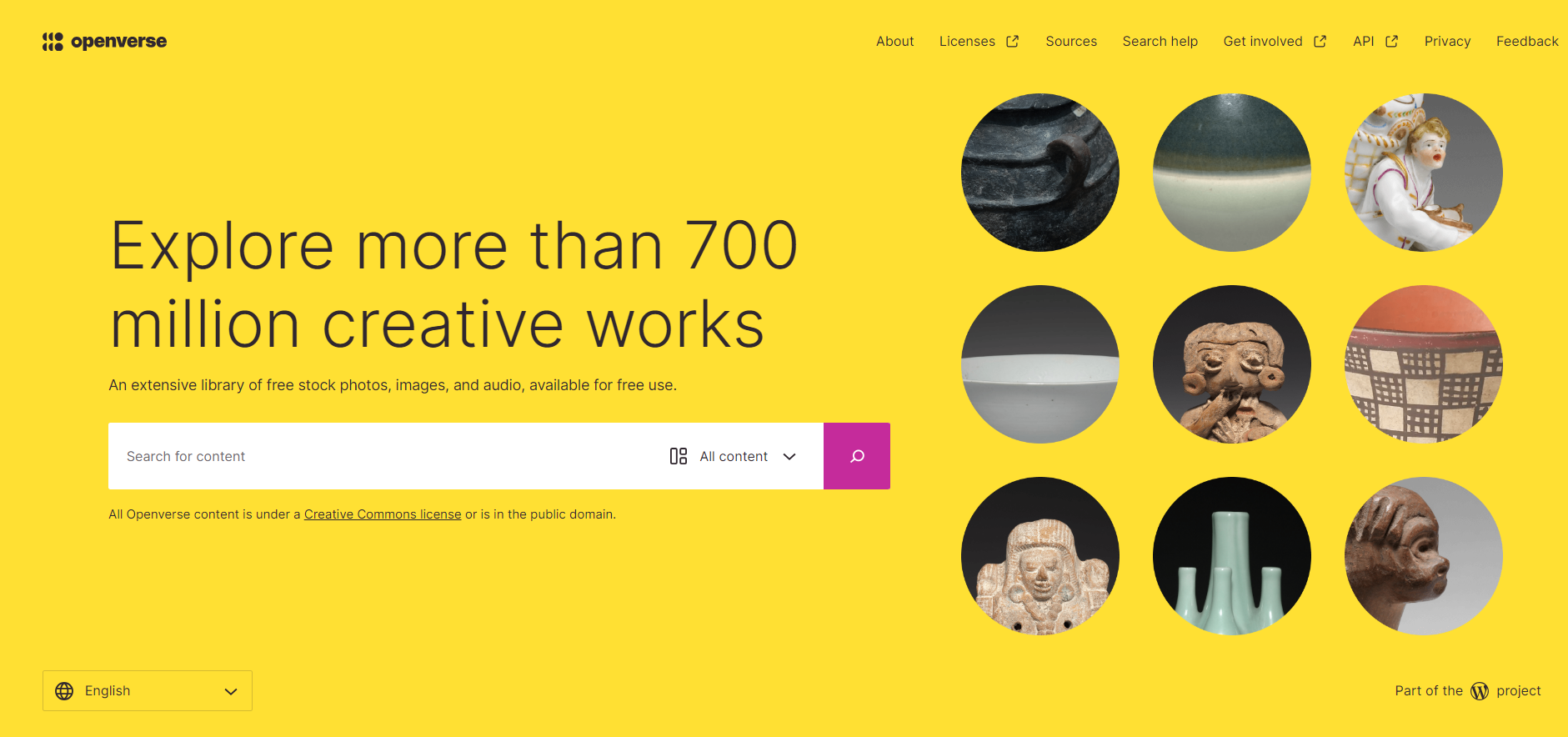 Screenshot from openverse.org
Screenshot from openverse.orgOpenverse should be your first stop on the hunt for nearly any type of copyright-free content.
While Google provides a broader range of search results, Openverse stands out with its focus on a vast, searchable collection of open-source media, including images, audio, and videos.
This search engine is perfect if you need music for a video, an image for a blog post, or anything else without worrying about angry artists coming after you for ripping off their work.
Mainstream Search Engines
Mainstream search engines are the Google alternatives that have managed to maintain a modest market share over the past several years.
7. Yahoo.com
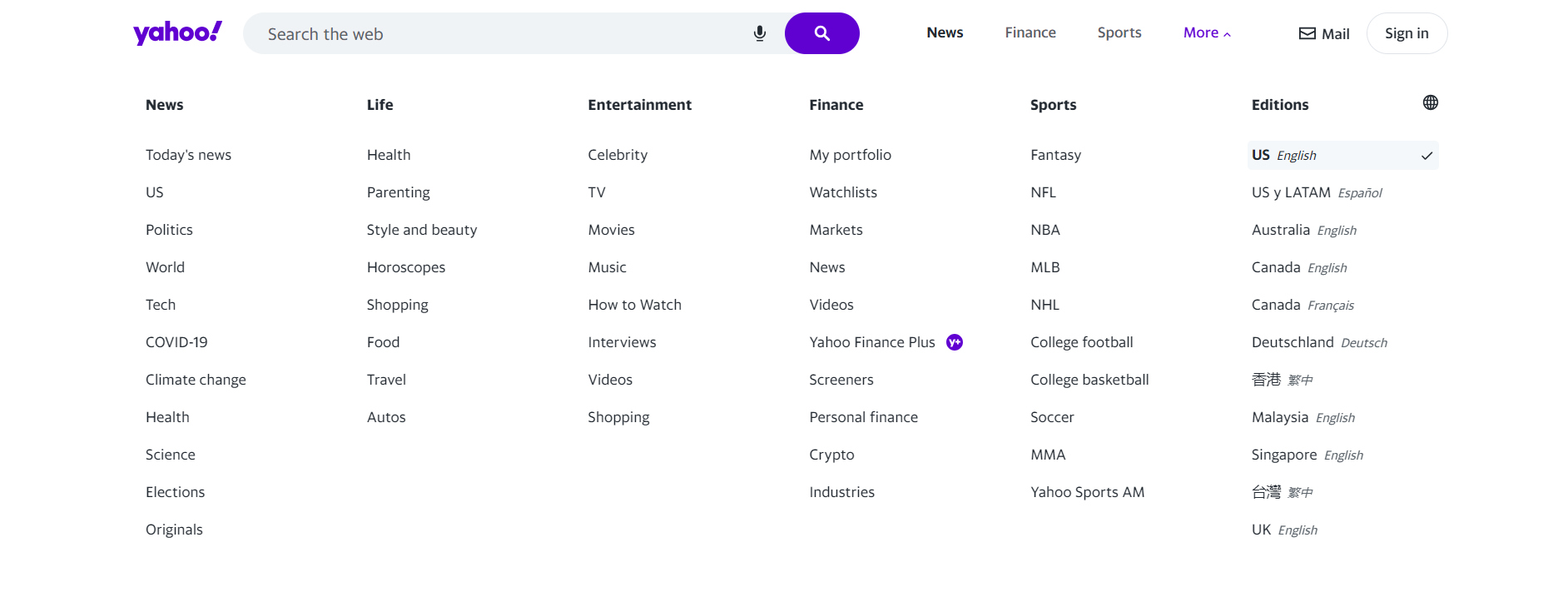 Screenshot from Yahoo.com
Screenshot from Yahoo.comAs of December 2023, Yahoo.com (Verizon Media) had a search market share of 2.56% in the US.
Yahoo’s strength is in diversification by offering services like email, news, finance, and more in addition to search.
Yahoo has been innovating and evolving for more than two decades.
It made a cryptic tweet on January 20 about making search cool again but did not take me up on my request to explain what that means.
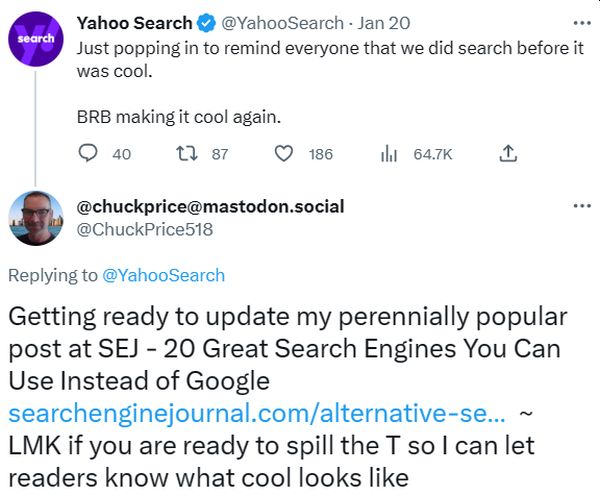 Screenshot from Twitter, February 2023
Screenshot from Twitter, February 20238. Ecosia
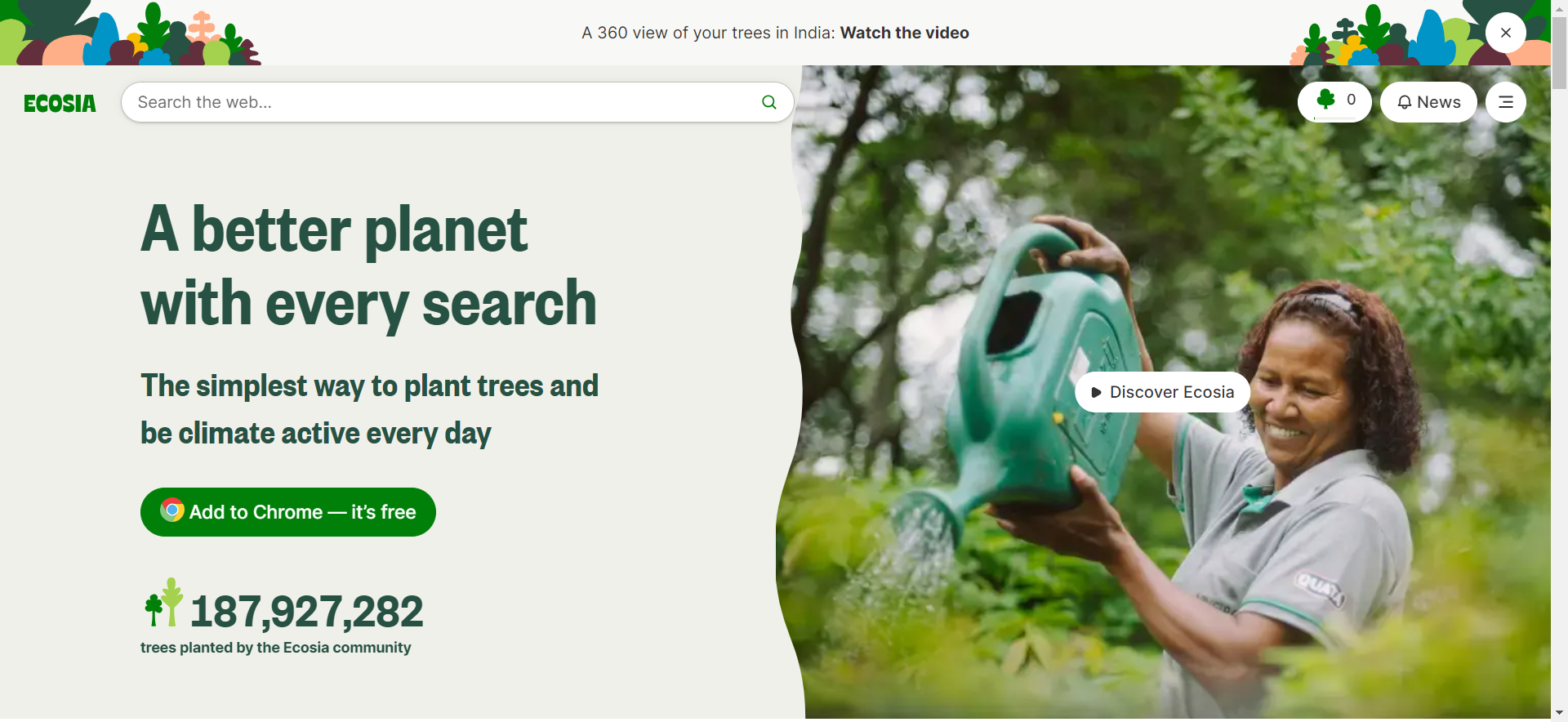 Screenshot from Ecosia.org, December 2023
Screenshot from Ecosia.org, December 2023Ecosia’s primary distinguishing feature is its commitment to using ad revenue for environmental purposes, specifically tree planting.
The company is a not-for-profit business and dedicates 100% of its profits to the planet, collaborating with local communities to plant and care for trees around the world.
It partners with Microsoft’s Bing to use its search index and web advertisement and offers a browser extension for quicker access to the search engine.
9. Aol
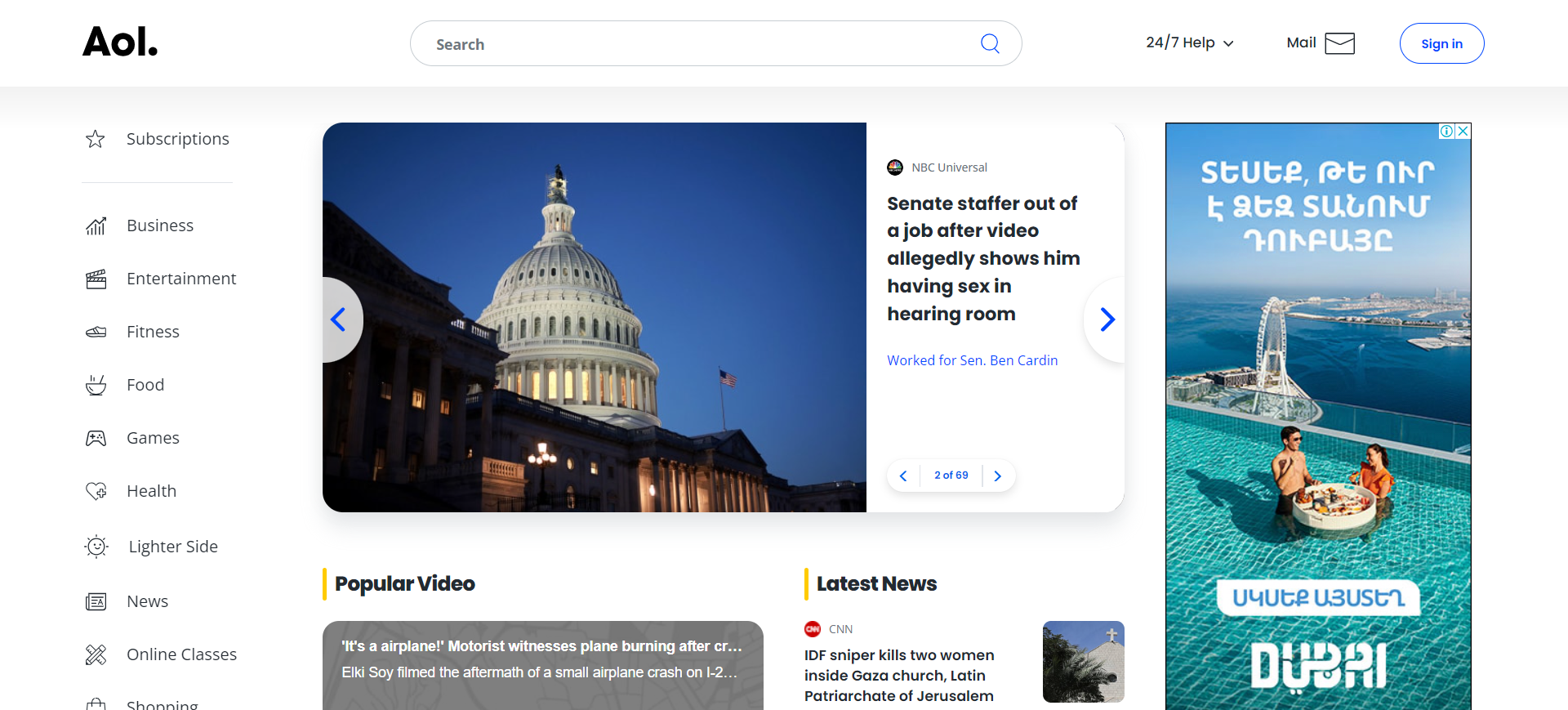 Screenshot from aol.com, December 2023
Screenshot from aol.com, December 2023AOL Search is one of the first search engines on the Internet, with a market share of 0.09% in the US.
It relies on partnerships with Google and Bing for its search results.
Unlike Google’s broad focus, AOL leans towards curated content, prioritizing news, entertainment, and a mix of AOL-owned, syndicated, and external website results.
While AOL tracks user data to personalize its advertising, it’s generally considered less sophisticated compared to Google. Its targeting relies more on broad demographics and interests than the highly granular individual profiles Google often builds.
Privacy-Focused Search Engines
Privacy is an increasingly important issue among internet users.
Privacy-focused search engines prioritize users’ privacy, and their appeal is that they do not track users’ activities or collect personal data.
Some of the most popular include:
10. DuckDuckGo
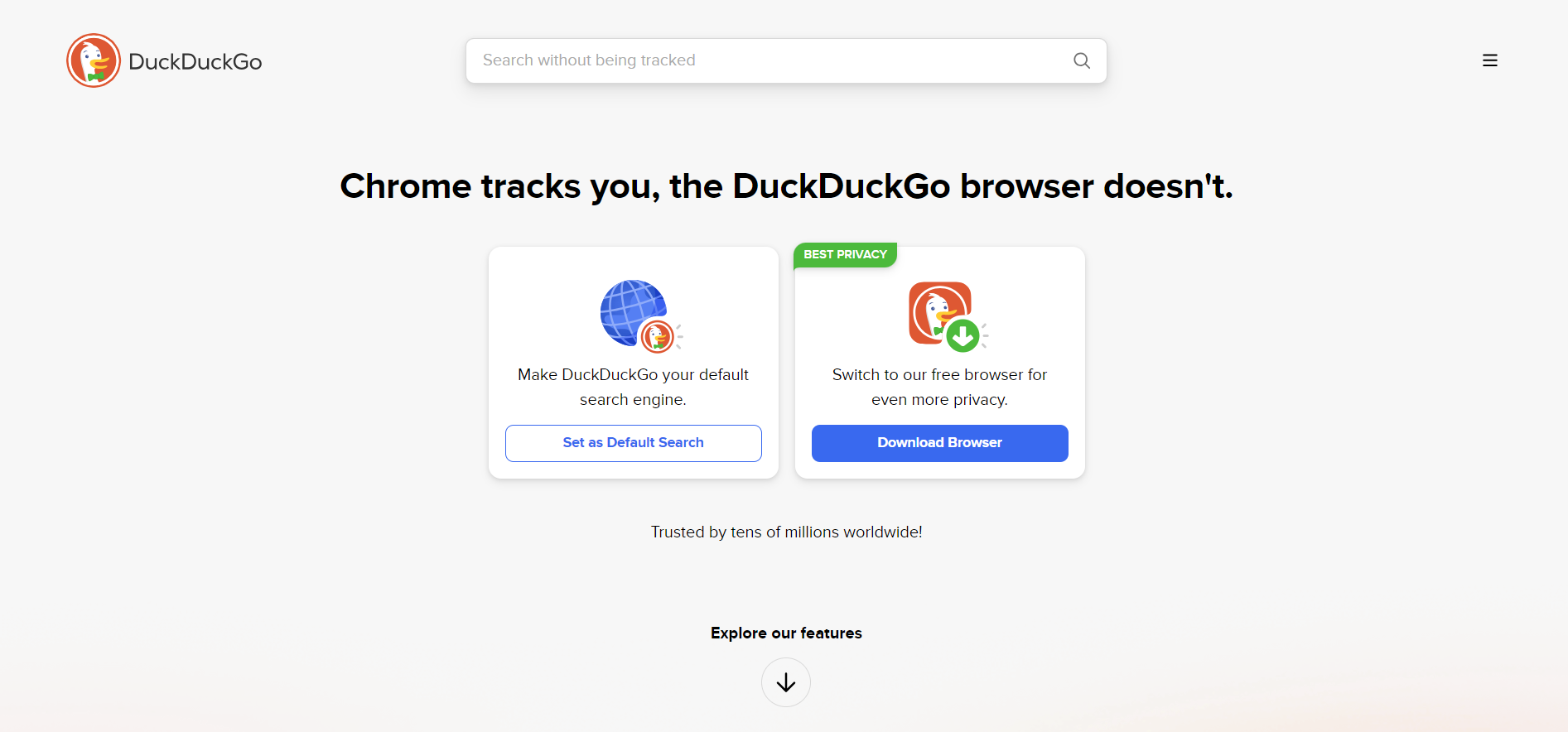 Screenshot from DuckDuckGo, December 2023
Screenshot from DuckDuckGo, December 2023As of December 2023, DuckDuckGo had a search market share of 2.13% in the United States.
DuckDuckGo is a search engine that could also fit into the mainstream category, but the primary “selling feature” is that it doesn’t collect or store any of your personal information.
Unlike Google, which collects extensive user data to personalize search results and advertisements, DuckDuckGo does not track or profile its users. This means that when you search on DuckDuckGo, your activity remains anonymous.
Because DuckDuckGo does not track search history or create user profiles, it does not offer filter options based on a user’s search history profile, and there are no persistent targeted ads.
That means you can run your searches in peace without having to worry about the boogeyman watching you through your computer screen.
DuckDuckGo is the perfect choice for those who wish to keep their browsing habits and personal information private.
DuckDuckGo Lite is the mobile version.
11. Startpage
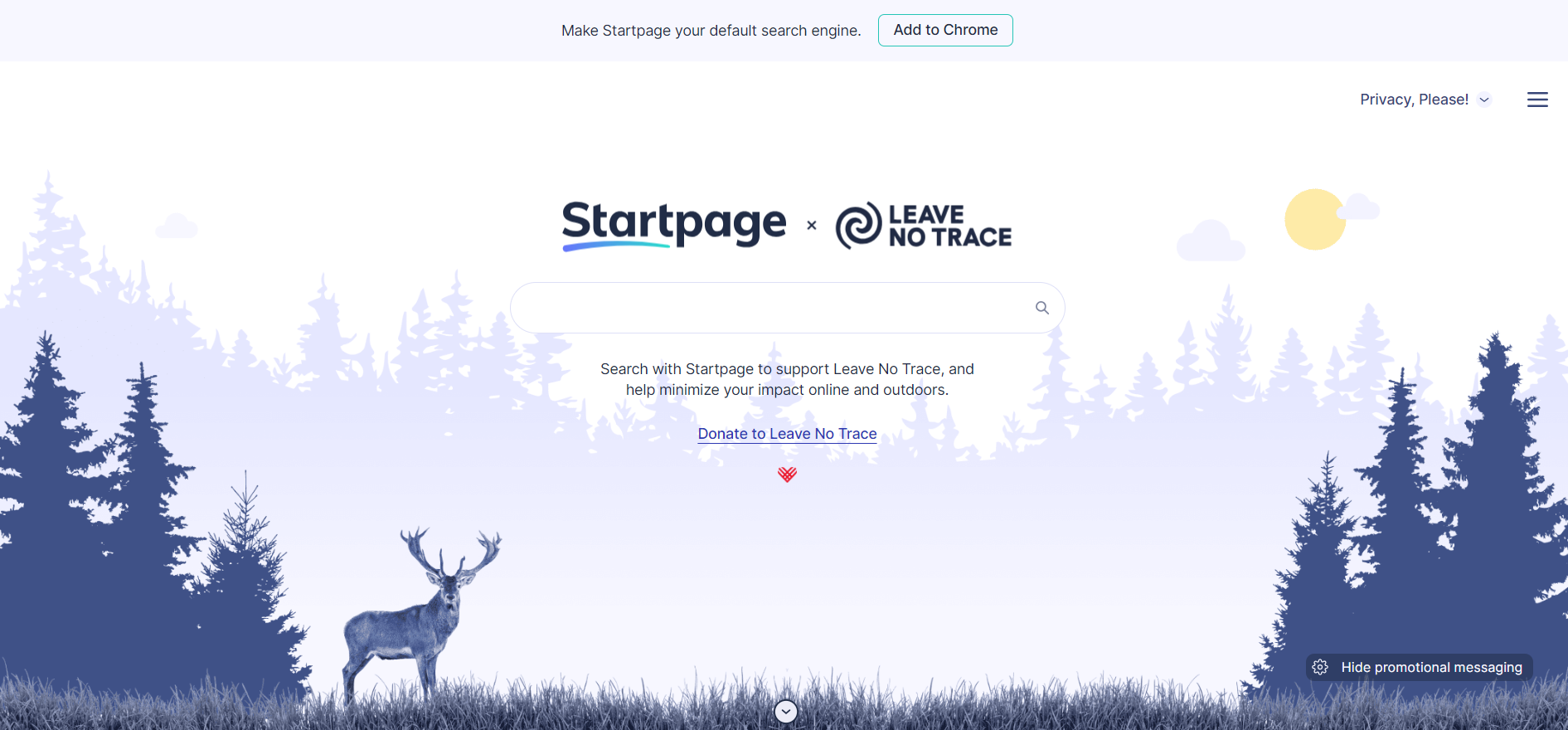 Screenshot from Startpage, December 2024
Screenshot from Startpage, December 2024Startpage is a search engine aggregation and does not crawl the web itself.
Instead, it utilizes a metasearch approach, fetching results from multiple search engines, including Google, Bing, DuckDuckGo, etc., and prioritizing links that appear in all.
It’s a great choice for those who prefer Google’s search results but aren’t keen on having their search history tracked and stored.
It also includes a URL generator, proxy service, and HTTPS support.
The URL generator is especially useful because it eliminates the need to collect cookies. Instead, it remembers your settings in a way that promotes privacy.
12. Swisscows
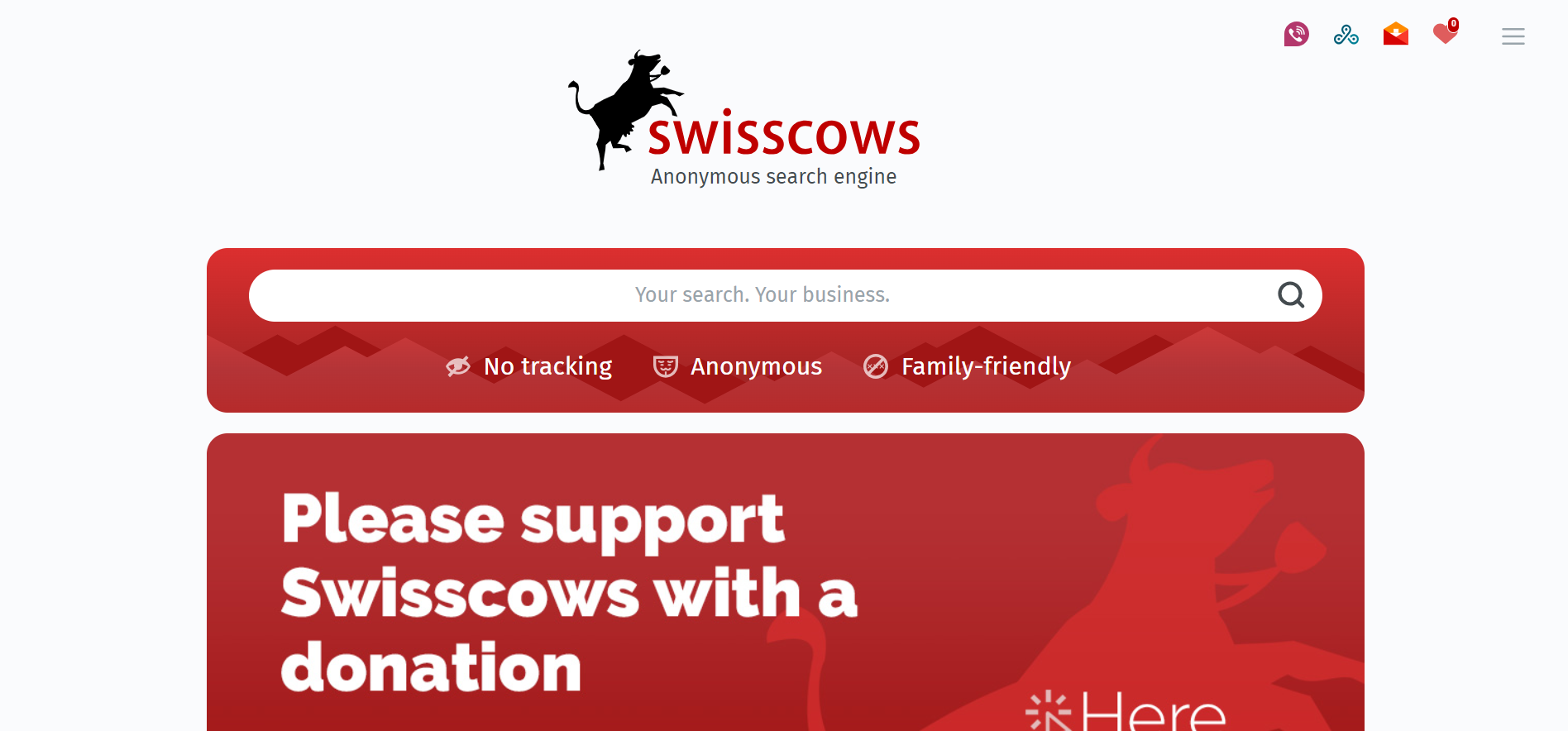 Screenshot from Swisscows.com, December 2023
Screenshot from Swisscows.com, December 2023Swisscows is a unique option on this list, billing itself as a family-friendly semantic search engine.
It utilizes Bing for its web search capabilities but has also developed its own index for the German language edition.
It also prides itself on respecting users’ privacy, never collecting, storing, or tracking data.
It uses artificial intelligence to determine the context of a user’s query.
Over time, Swisscows promises to answer your questions with surprising accuracy.
13. Gibiru
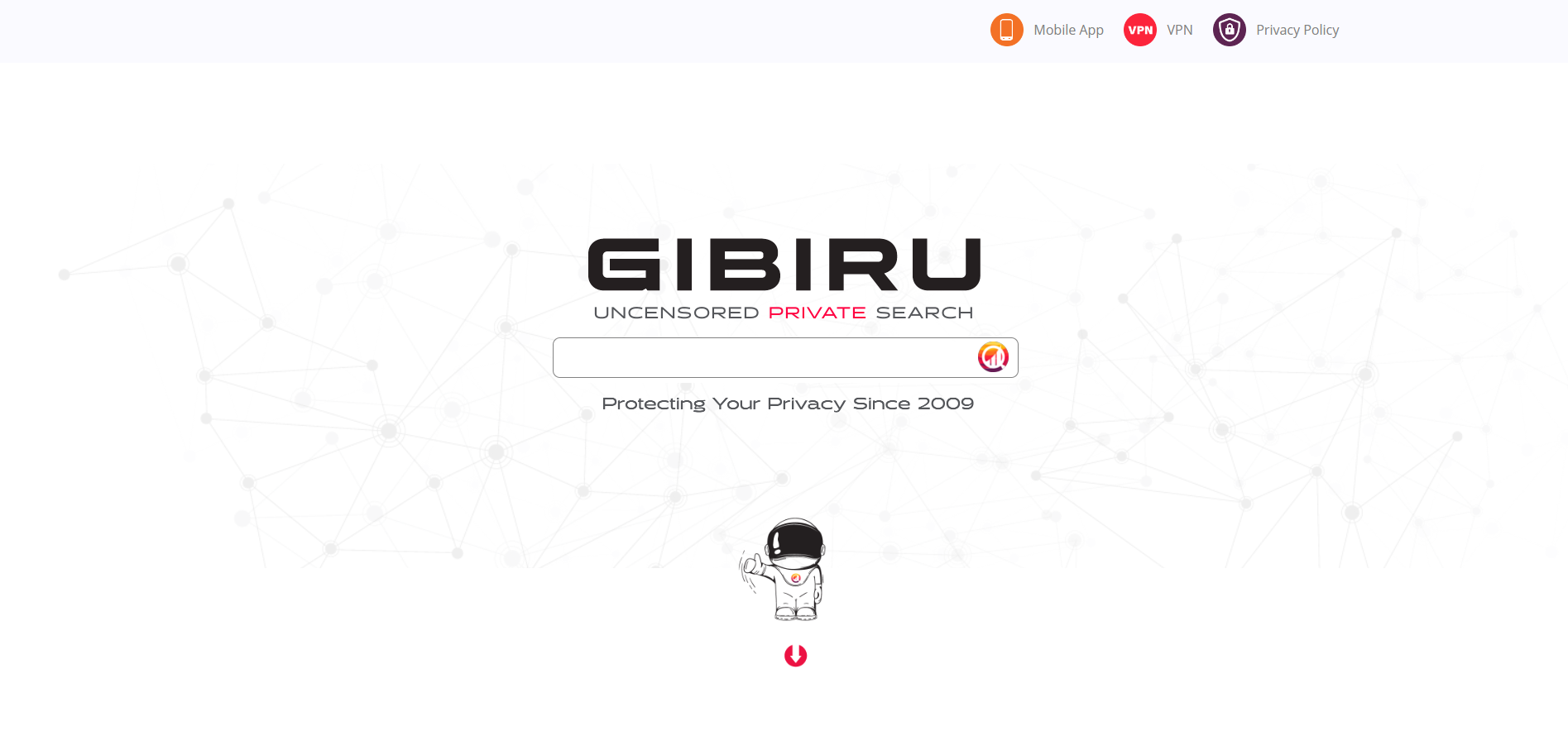 Screenshot from Gibiru.com, December 2023
Screenshot from Gibiru.com, December 2023According to its website, Gibiru features “Uncensored Private Search” with no retargeting and no selling of private data.
It claims its search results are sourced from a modified Google algorithm, so users are able to query the information they seek without worrying about Google’s tracking activities.
Gibiru earns commissions when users buy something or take action through its search results, aligning with its privacy-centric approach by not relying on personal data for advertising.
14. Brave
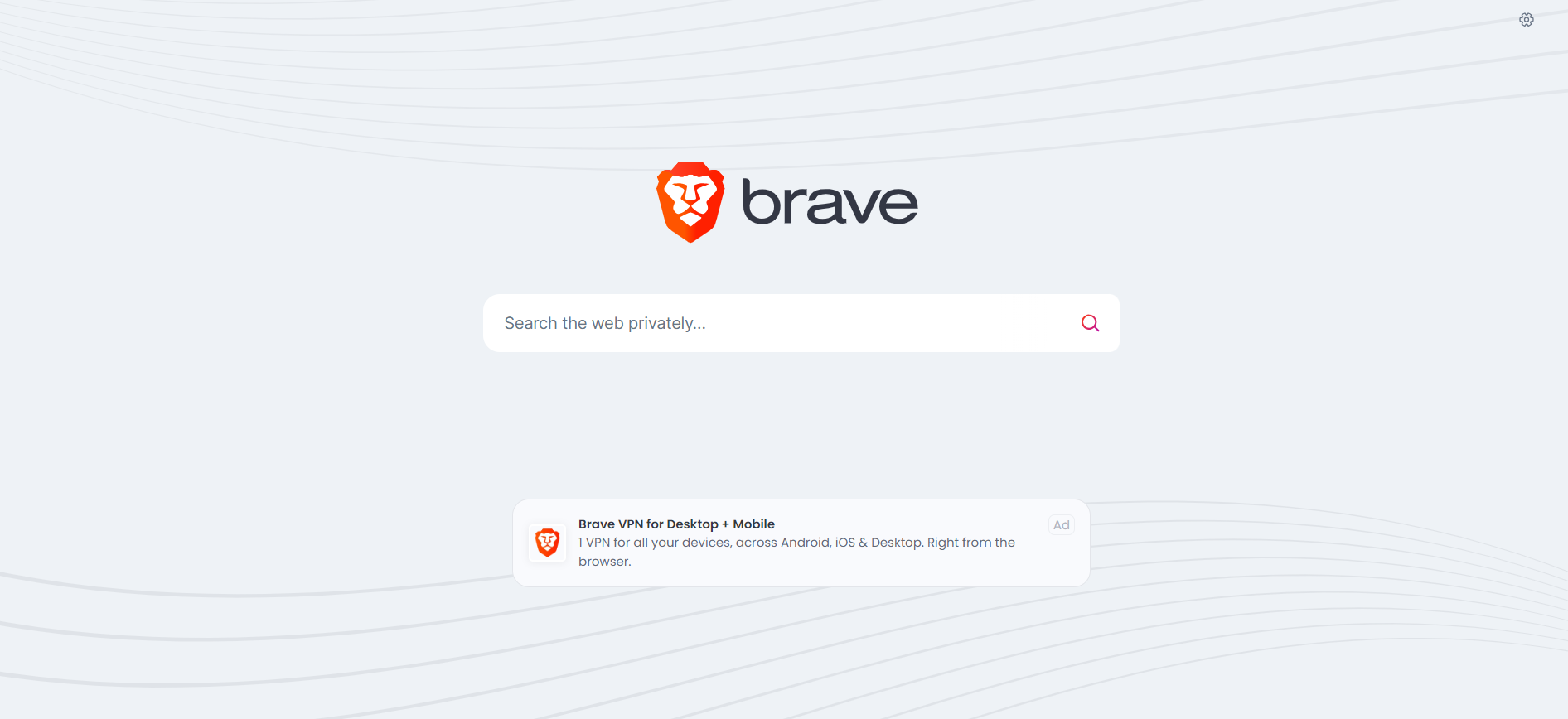 Screenshot from Brave.com, December 2023
Screenshot from Brave.com, December 2023In 2023, Brave Search achieved full independence from other search engines like Bing. It now operates solely on its own index, a move that emphasizes user privacy and transparency in search results.
Brave Search has experienced rapid growth; as of January 2024, it had 24.57 million daily active users. This growth reflects the increasing popularity of privacy-focused search engines.
It features free video calls, offline playlists, and a customizable news feed.
Advanced security features like IPFS integration, Tor (Onion Routing), and a crypto wallet are also available.
Brave offers rewards for opting into privacy-preserving ads. It claims over 65 million people use its browser each month for a faster and safer web experience.
Knowledge-Based Search Engines
15. Wiki.com
 Screenshot from Wiki.com, February 2023
Screenshot from Wiki.com, February 2023Wiki.com pulls its results from thousands of wikis on the net.
It is the perfect search engine for those who appreciate community-led information, as found on sites like Wikipedia.
16. X (Formerly Twitter)
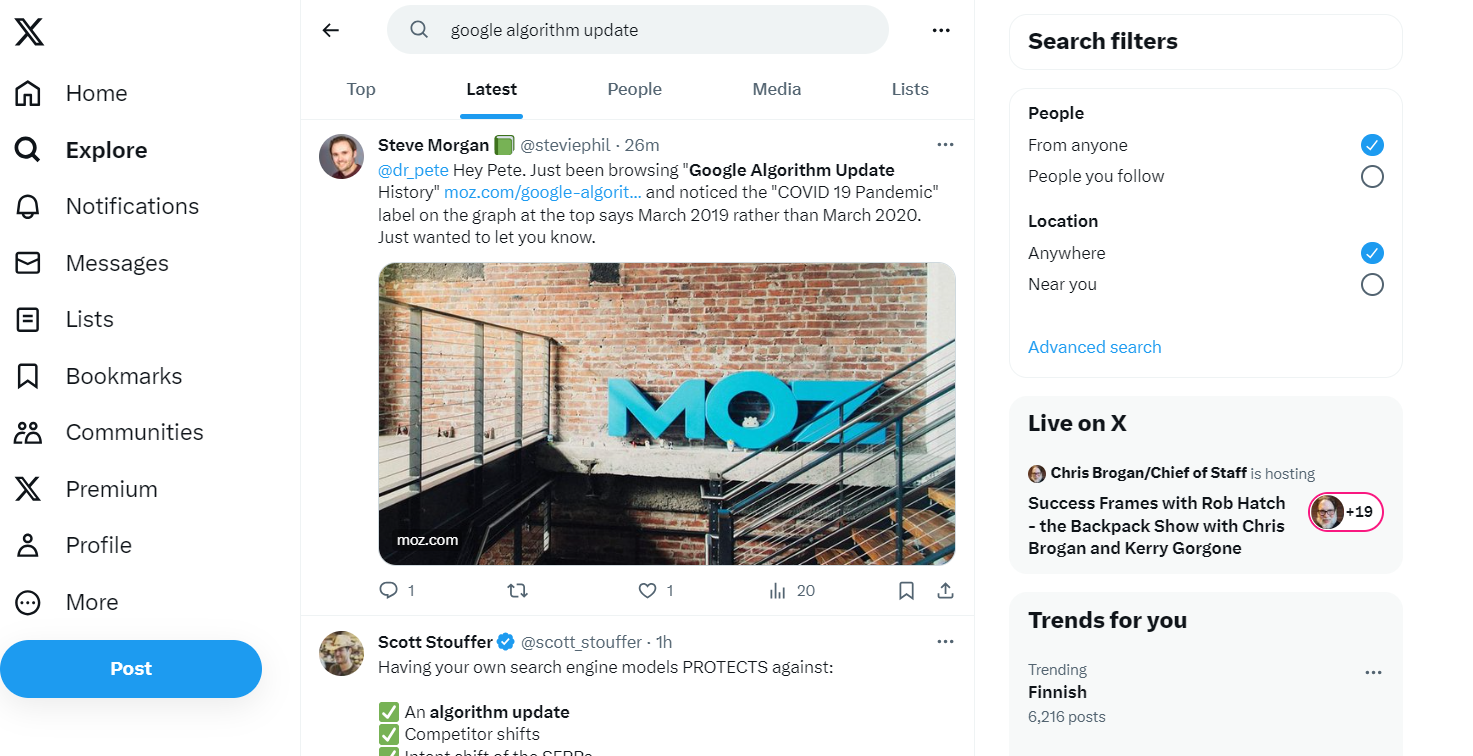 Screenshot from X
Screenshot from XX is hard to beat as a real-time search engine.
It’s the perfect place to go for minute-by-minute updates in case of an emergency.
Google will catch up eventually, but nothing beats a tweet in the heat of the moment.
To make the most of it, check out our guide to X/Twitter Advanced Search.
17. SlideShare
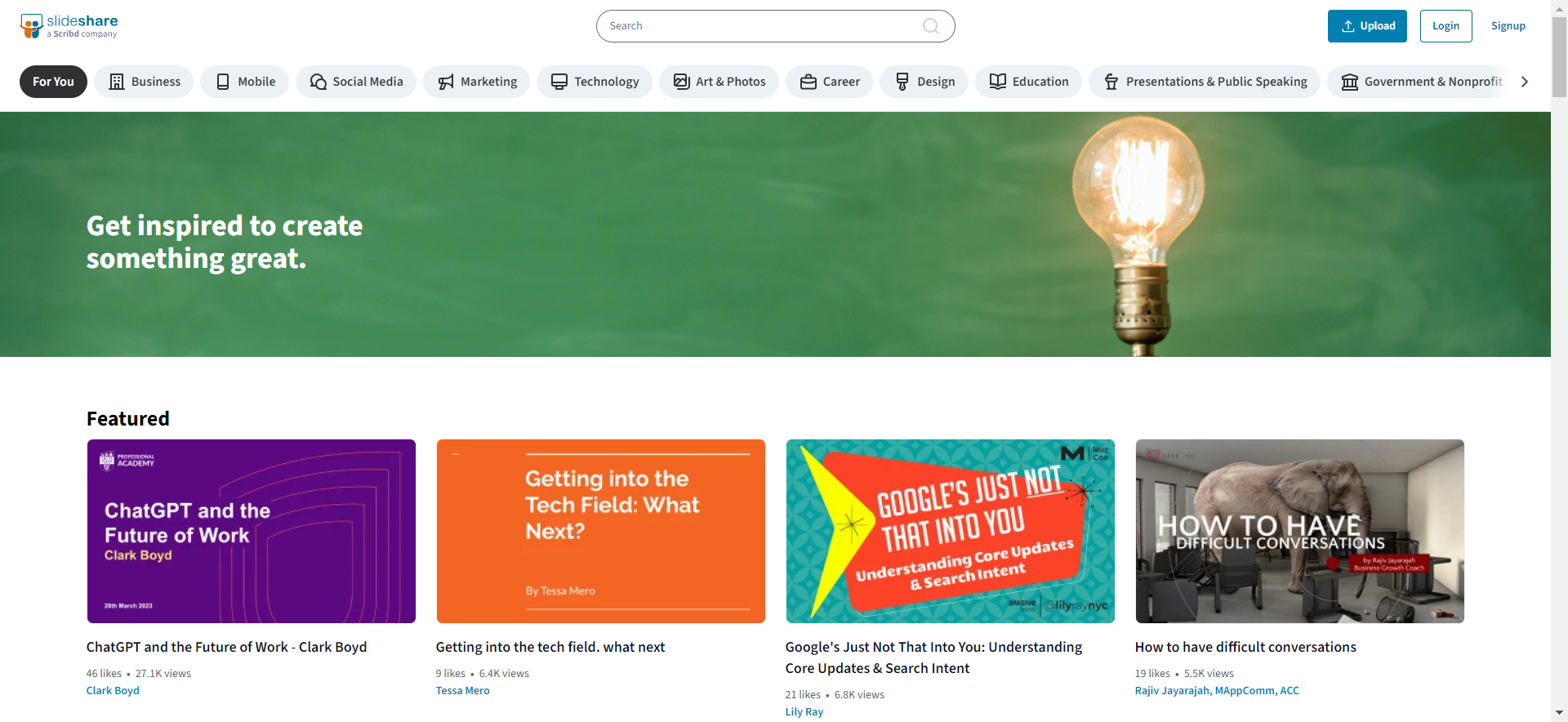 Screenshot from SlideShare, December 2023
Screenshot from SlideShare, December 2023SlideShare allows you to search for documented slideshow presentations.
You can also search for ebooks and PDFs, making it an excellent tool if you have a business presentation to prepare for.
SlideShare also allows you to save slides and even download the entire slideshow for use on your local computer.
18. Wayback Machine
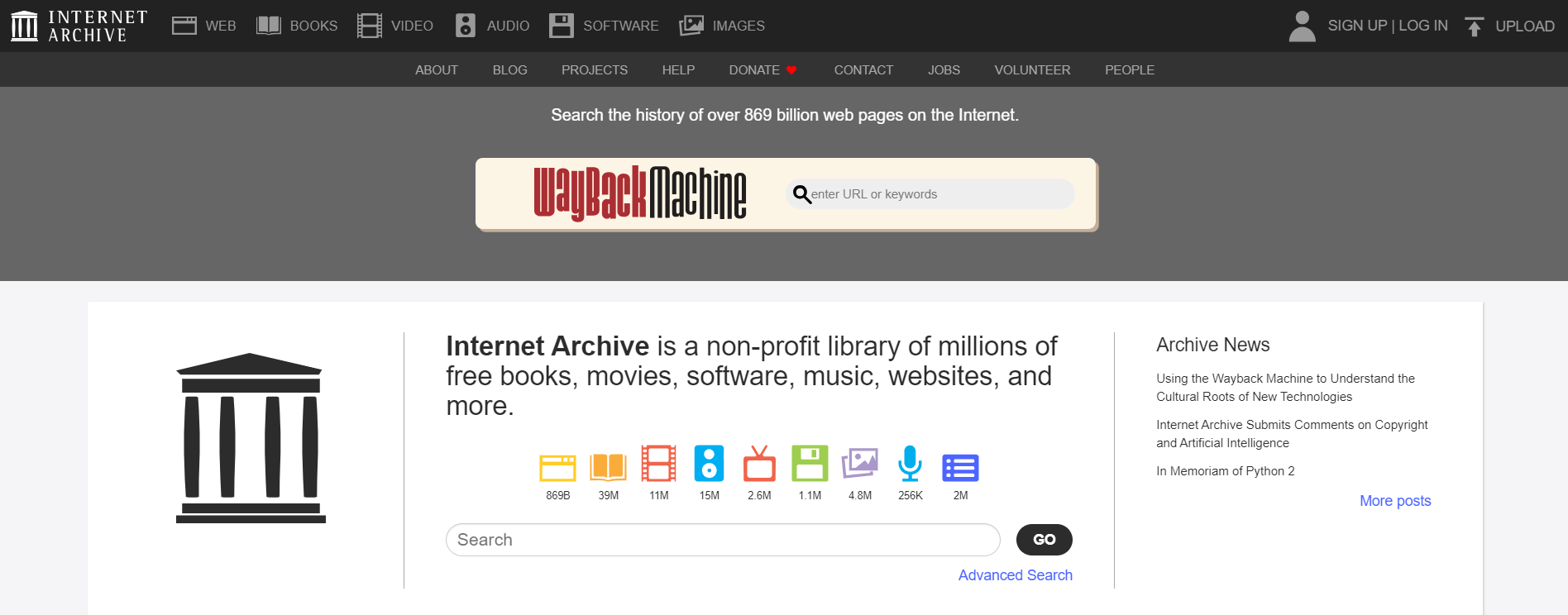 Screenshot from archive.org, December 2023
Screenshot from archive.org, December 2023Internet Archive, a.k.a. the Wayback Machine, is great for researching old websites, but it’s also so much more.
As the name implies, this search engine queries a massive collection of documented material, including millions of free videos, books, music, and software.
Essentially, the Internet Archive is a vast online library where you can access just about anything you could imagine.
Specialized Search Engines
Specialized search engines cater to particular needs, providing results based on specific criteria. For example:
19. WolframAlpha
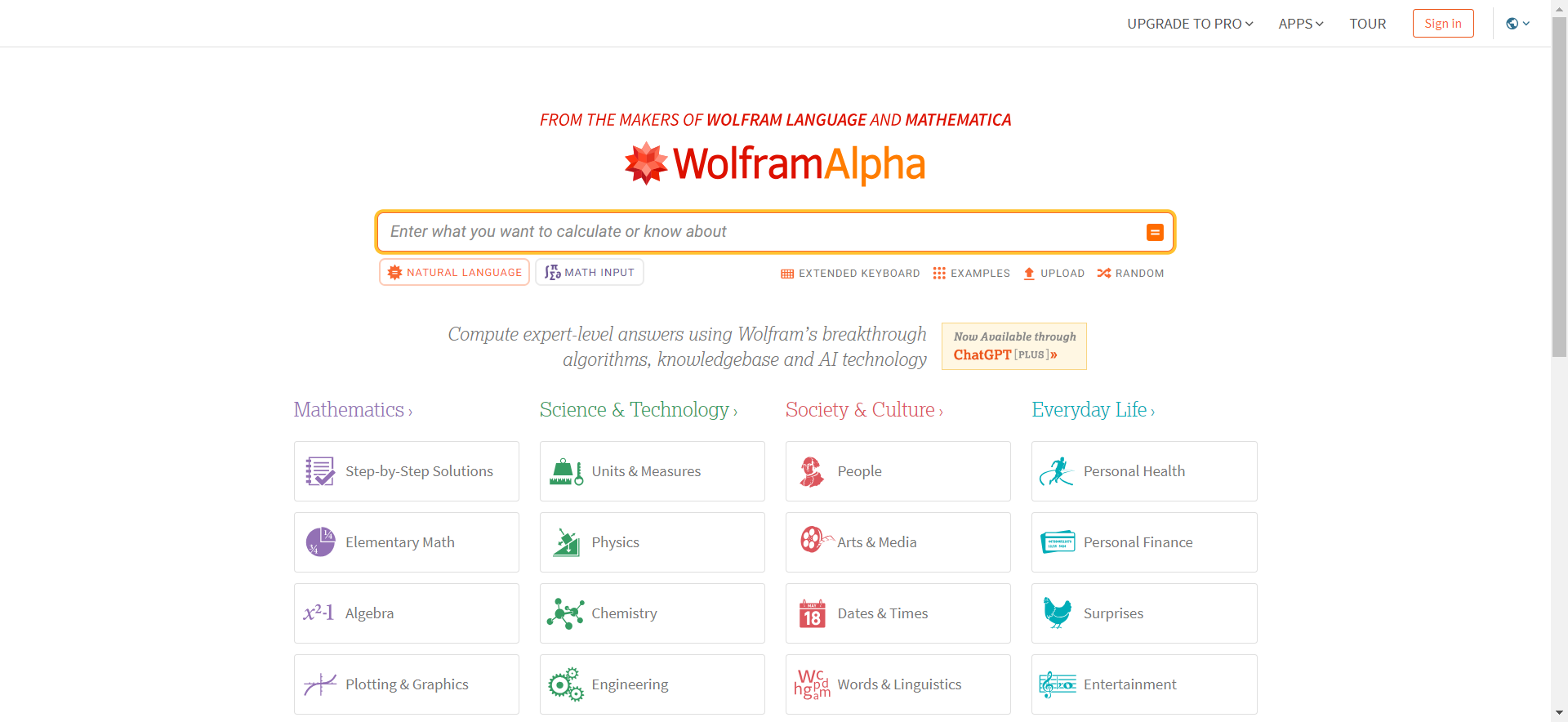 Screenshot from WolframAlpha.com, December 2023
Screenshot from WolframAlpha.com, December 2023WolframAlpha is a computational knowledge engine that allows you to compute answers to problems and search through expert-level data on a variety of subjects, from algebra to words and linguistics.
It also offers Pro features for individuals, students, and educators who need professional-grade computation and analysis of imported data.
Pricing starts at $5.49 per month.
20. LinkedIn
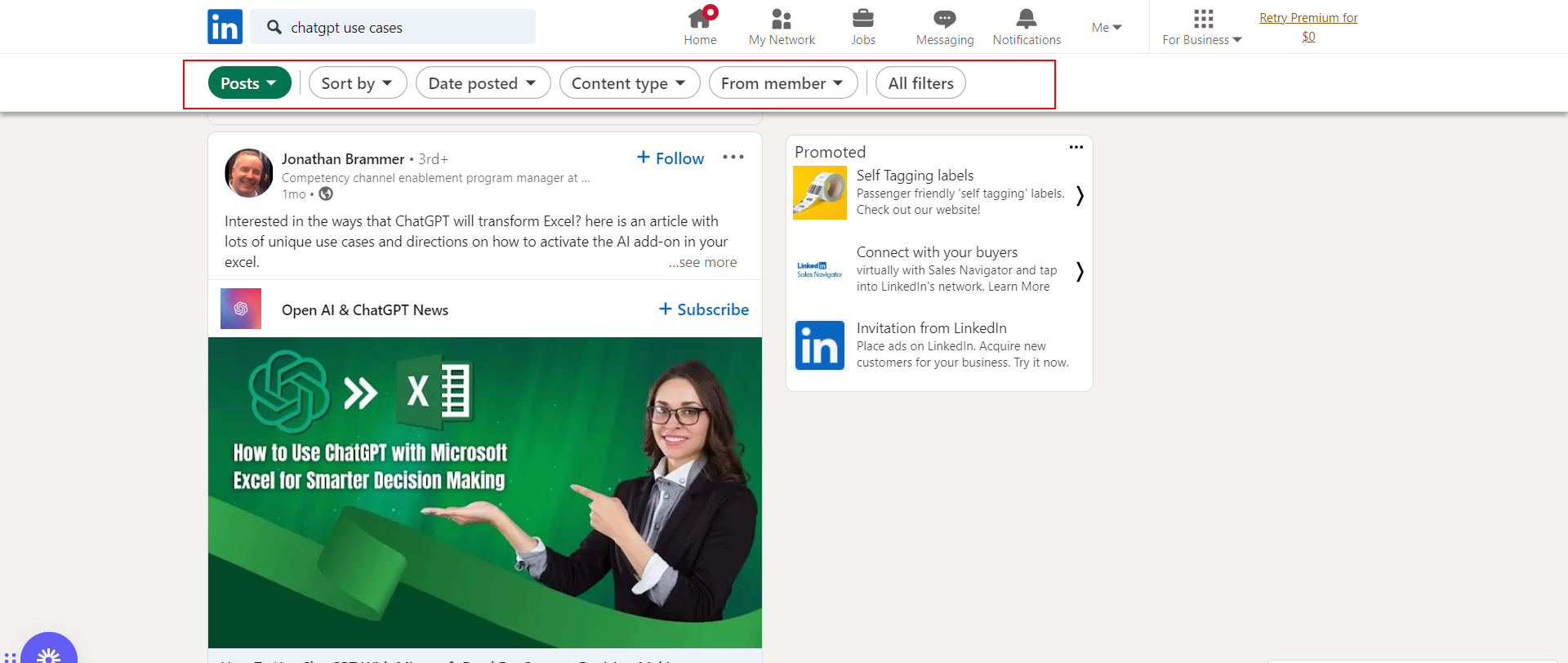 Screenshot from LinkedIn, December 2023
Screenshot from LinkedIn, December 2023LinkedIn, recognized as a professional networking platform, is increasingly being utilized as a business-focused search engine which has 61 million searches a week.
LinkedIn‘s search algorithm for organizations considers the uniqueness and specificity of an organization’s LinkedIn Page name, as generic names tend to yield broad, less relevant results.
For instance, an organization named “Innovative Tech Solutions” would likely rank higher than one named “Professional Technology Services” due to the uniqueness of the name.
However, overloading a profile with keywords can be counterproductive, as it might trigger spam detection algorithms and negatively impact search visibility.
The algorithm also factors in the number of Page followers, connections between the Page and the searcher, the activity level on the Page, and the ratio of relevant search terms in the organization’s name.
International Search Engines
International search engines cater to specific regions and provide results based on local language and culture.
Some popular international search engines include:
21. Baidu
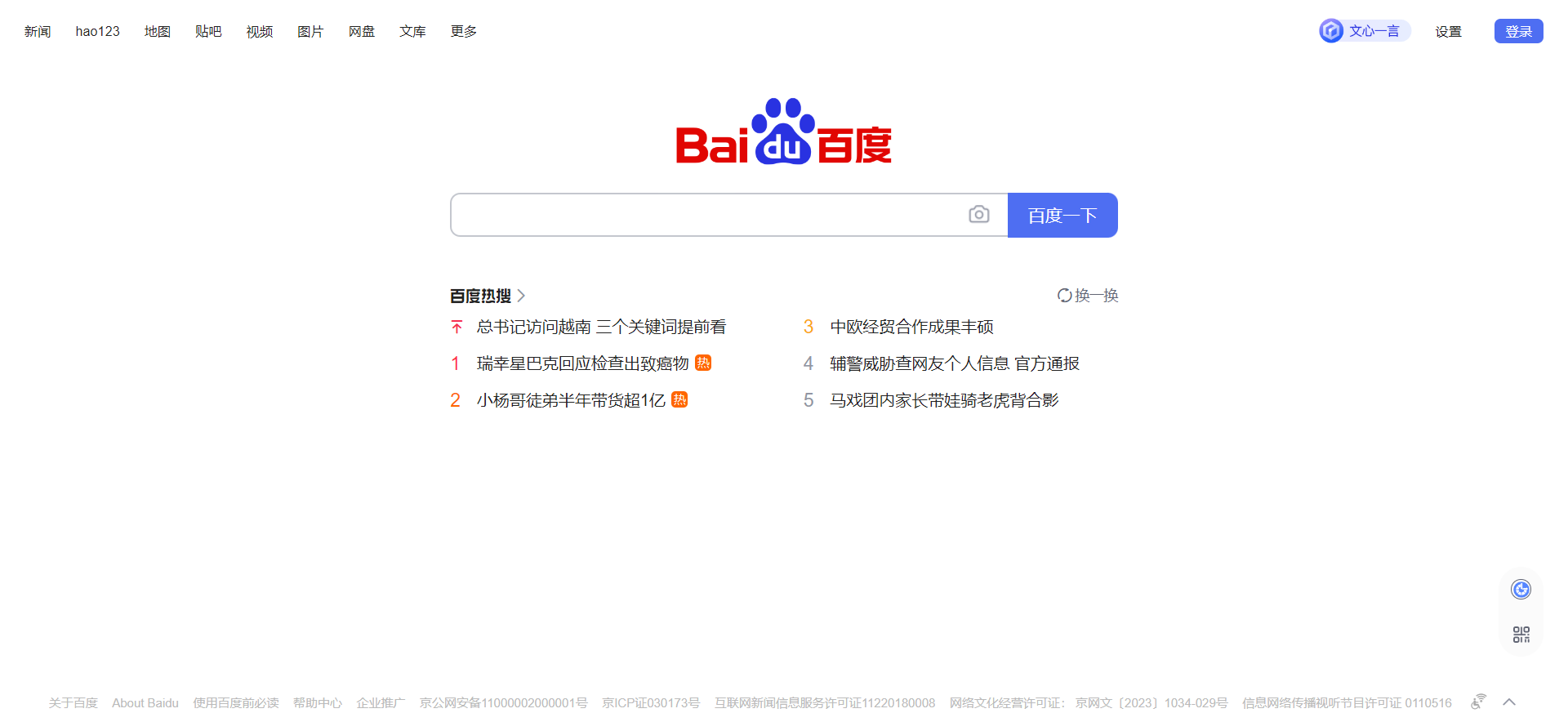 Screenshot from Baidu.com
Screenshot from Baidu.comBaidu is the largest search engine in China and has a 66% market share there.
Like Google, it offers a broad range of services, including maps, music, videos, and an app store.
Baidu also has a mobile browser and mobile app.
22. Yandex
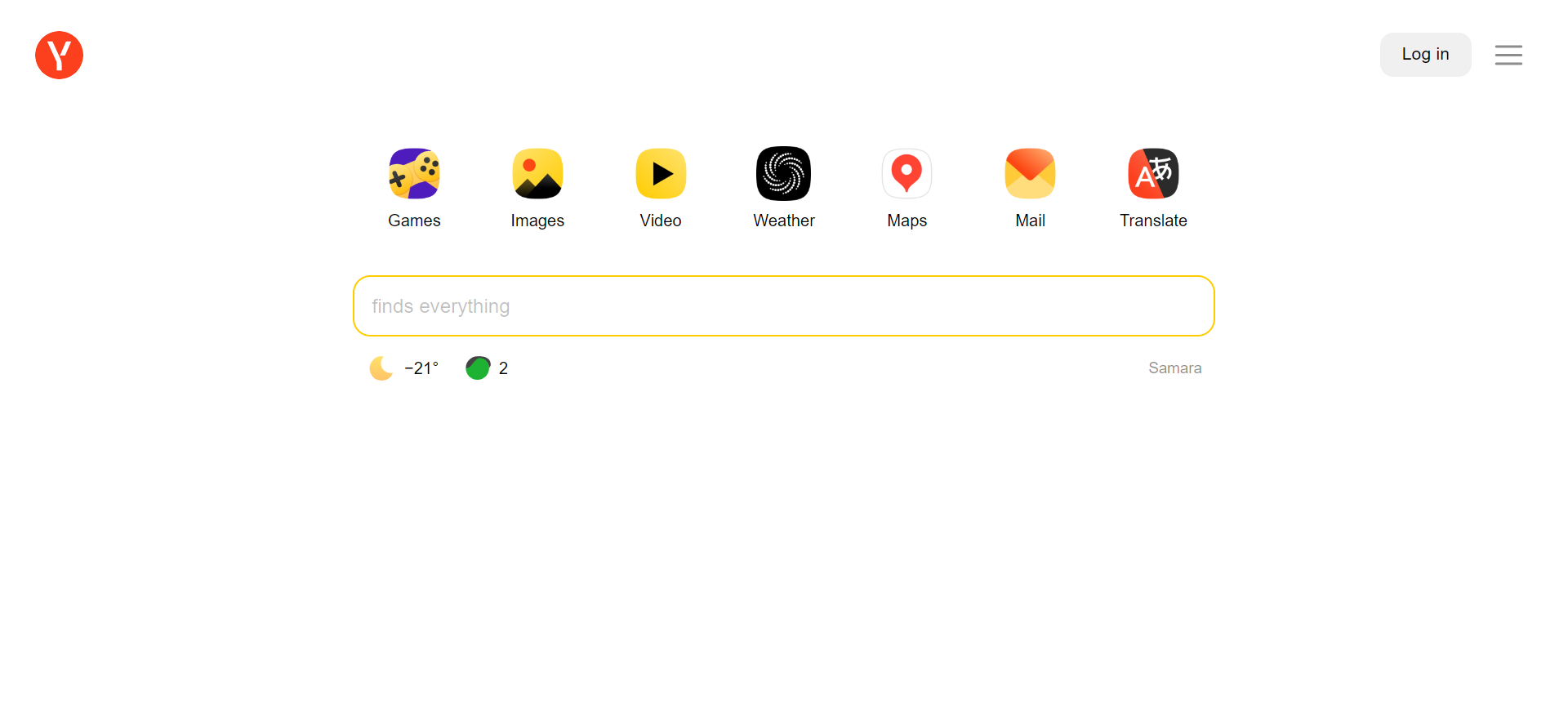 Screenshot from Yandex, December 2023
Screenshot from Yandex, December 2023Yandex is used by more than 69% of Russian internet users. It is also used in Belarus, Kazakhstan, Turkey, and Ukraine.
Yandex is an overall easy-to-use search engine.
As a bonus, it offers a suite of some pretty cool tools.
It had a data leak in January 2023, leaving many speculating about the relevance of what was revealed.
23. Sogou
 Screenshot from Sogou, December 2023
Screenshot from Sogou, December 2023Sogou is a Chinese search engine that is growing in popularity and has a 5% market share in China.
Sogou Search is an interactive search engine supporting WeChat, article search, English search and translation, and more.
It prides itself on providing users with professional, accurate, and convenient search through self-developed artificial intelligence algorithms.
24. Naver
 Screenshot from naver.com, December 2023
Screenshot from naver.com, December 2023Naver is a popular search engine in South Korea with a 34% market share in the country. It offers a range of services, including blogs, news, music, and shopping.
It also has a mobile app for searching on the go.
Naver is a great option for those looking for a search engine tailored to the Korean market.
The Takeaway
Google may be the most popular choice in search engines, but it may not always be the best choice, depending on your needs and priorities.
Alternative search engines can offer a wide range of benefits, including a better search experience and higher levels of privacy.
Nonetheless, do yourself a favor and give some of these a try.
More Resources:
- The 6 Best AI Search Engines To Try Right Now
- Meet The 7 Most Popular Search Engines In The World
- How Search Engines Work
- State Of SEO 2025
Featured Image: Dilok Klaisataporn/Shutterstock
FAQ
How can I switch to an alternative search engine?
Switching to an alternative search engine is a relatively simple process. Simply change your default search engine in your web browser to the desired search engine.
How do private search engines make money?
Unlike mainstream search engines that may use extensive data for personalized ads, private search engines rely on search terms for contextual ads, affiliate links for purchases via their platform, and user donations for funding.




![[SEO, PPC & Attribution] Unlocking The Power Of Offline Marketing In A Digital World](https://www.searchenginejournal.com/wp-content/uploads/2025/03/sidebar1x-534.png)